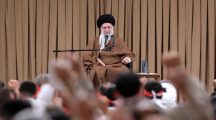23, March 2017
UN says Biya regime expelled 2,600 Nigerians fleeing Boko Haram 0
More than 2,600 Nigerians who fled into northern Cameroon to escape Boko Haram Takfiri militants have been forced to go home since the start of the year, the UN said Tuesday. Thousands of Nigerians have been displaced by the Boko Haram insurgency, which has seen deadly attacks since 2009 in pursuit of a caliphate in northern Nigeria.
Some 85,000 have sought refuge in Cameroon but the UN refugee agency said many had been sent back, with officials citing security reasons. “So far this year, Cameroon has forcefully returned over 2,600 refugees to Nigerian border villages against their will,” UNHCR spokesman Babar Baloch told reporters in Geneva.
He said UNHCR staff in Nigeria had heard and documented accounts about Cameroon troops forcing refugees to return to Nigeria, “without allowing them time to collect their belongings.” Baloch pointed to a case where refugees were rounded up during a military offensive against Boko Haram insurgents in the Mandara Mountains on the Cameroonian side of the border. They were then taken in trucks to a camp for displaced people in Banki, in Nigeria’s Borno State.
“Those returned included a one-year-old child and a nine-month pregnant woman, who gave birth the day after her arrival in Banki,” he said. “During the chaos families were separated and some women were forced to leave their young children behind in Cameroon, including a child less than three years old,” he added.
The UNHCR said it was particularly alarmed to see that the forced returns were continuing unabated after its previous protests and even after the governments of Nigeria and Cameroon signed an agreement with the UN on March 2 to ensure voluntary returns when possible. “While recognising the legitimate national security concerns of the Cameroon government, UNHCR reminds authorities that refugees are themselves fleeing violence and attacks from Boko Haram and that their access to asylum and protection must be ensured,” the agency said.
Baloch stressed that the forced return of asylum seekers and refugees constitutes refoulement, which is a serious violation of international law. Though Boko Haram was born in Nigeria, the Daesh-affiliated group has carried out frequent attacks in Cameroon, Chad and Niger, prompting the formation of a regional force to fight back. Some 200,000 Cameroonians from the Far North region near Nigeria have left their villages in fear of the violence.
Presstv































23, March 2017
Senior Canadian MP calls for gov’t intervention over escalating Anglophone Crisis 2
A senior Canadian member of parliament, Hélène Laverdiere has written a letter to the Canadian Minister for Foreign Affairs on the Southern Cameroons crisis. Hon. Laverdiere who is also a prominent figure in the Foreign Affairs Committee in the Canadian National Assembly observed that the rise of violence between Francophone and Anglophone communities in Cameroon is very disturbing as the next presidential election is scheduled for 2018.
In the letter to Chrystia Freeland, her country’s Foreign Minister, Hélène Laverdiere, spokesperson for the New Democratic Party (NDP) demanded for an update on Canada’s position on the Anglophone crisis. She added that many Canadians have expressed concern about the violation of human rights in Cameroon.
The much respected MP revealed that in addition to the humanitarian crisis and refugees in the Lake Chad region, coupled with the fight against Boko Haram, Cameroon is struggling with a complex internal political crisis. In recent months, the Biya Francophone Beti Ewondo regime in power since 1982 has restricted the rights of Anglophone Cameroonians. Reports indicate that freedom of the press is reduced, civil society organizations have been dismantled, schools have been closed and electronic communications are interrupted in the English-speaking regions.
Hélène Laverdiere added to this picture, poverty and unemployment which is very widespread in Cameroon. She hinted that the stability of Cameroon is threatened. Hence the need for an intervention by Canada, which, like Cameroon, has English and French as its official languages. “As a country with two official languages, Canada is well positioned to play a positive and constructive role in encouraging respect for people, including those related to language, in Cameroon. Canada also has some expertise in conflict prevention and mediation that could be crucial to a political solution to this crisis, “she noted. She appealed to Chrystia Freeland to communicate with her Cameroon counterparts to offer Canada’s support to end the crisis.
By Chi Prudence Asong with files from Cameroun Info.Net